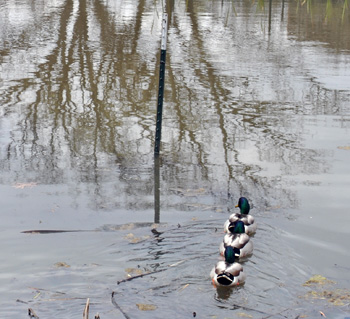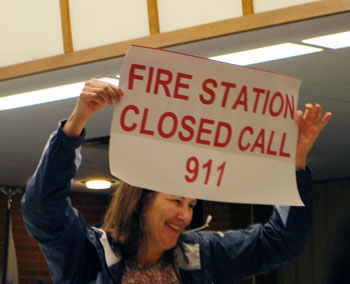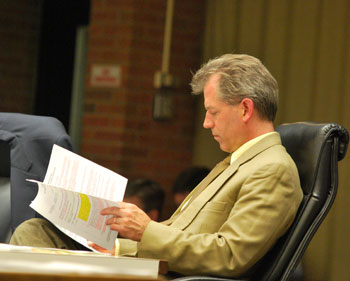Park Commission Briefed on Millage Renewal
Ann Arbor park advisory commission meeting (March 20, 2012): At their monthly meeting, park advisory commissioners were briefed on two millages that help fund Ann Arbor’s park system, including one that will likely be on the November ballot for renewal.

Creatures in West Park will not be able to participate in the November millage vote, even though they apparently can get their ducks in a row. A parks millage that's up for renewal helped pay for some of the recent renovations to the park, including the boardwalk, bandshell plaza and entry stairs. (Photos by the writer.)
The park maintenance and capital improvements millage, a six-year tax, brings in about $5 million annually and accounts for about 45% of the parks budget – including the entire funding for the natural areas preservation (NAP) program. Voters will likely be asked to renew it at 1.1 mills from 2013-2018, assuming the city council votes to put the millage on the Nov. 6 ballot at that rate. PAC chair Julie Grand – who has served on a working group to strategize about the renewal – said concerns about the economic climate are a major reason why an increase isn’t being recommended.
During the millage discussion, city councilmember Mike Anglin said he supports the millage but has concerns about Fuller Park, noting that talks regarding Fuller Road Station aren’t over. Parks manager Colin Smith pointed out that no millage funds have been or would be spent on Fuller Road Station. Grand cautioned against connecting the millage renewal to Fuller Road Station, saying it’s important to inform the public clearly about what the renewal means.
To provide that information, the city plans to hold four public forums in April, and a public hearing on the millage will be scheduled for PAC’s April 17 meeting. The city also plans to launch a website in early April with more information about the millage.
Also at the March 20 meeting, commissioners got a mid-year update about the open space and parkland preservation millage, which funds the greenbelt program and park acquisitions. Fuller Road Station was a backdrop to this discussion too, when commissioner Gwen Nystuen asked about protections that are afforded land acquired through this millage.
Land acquisition also came up in two other contexts during the meeting. The future of property owned by MichCon – located north of Broadway Street, between the Huron River and the railroad tracks – was part of the discussion during an update on environmental cleanup at the site. A DTE Energy representative indicated that senior management sees the potential for redevelopment there, but no plans are finalized. It’s expected that DTE Energy, which owns the property through its MichCon subsidiary, will eventually sell the site.
And speaking during public commentary, Ann Arbor resident Larry Baird advocated for the city to acquire land to fill gaps in the Border-to-Border Trail, which roughly follows the Huron River. Specifically, he characterized a connection between Bandemer Park and Barton Nature Area as the top priority, and urged the city to focus more on this project than on high-speed rail.
In the agenda’s one action item, commissioners recommended awarding a $79,980 contract to Michigan Recreational Construction Inc. to handle renovations at Placid Way Park. The resolution also recommends an additional 10% contingency of $7,998 for a total project cost of $87,978. The 1.32-acre neighborhood park is located on the city’s north side near the larger Dhu Varren Woods Nature Area and Foxfire South Park. The project would be funded from the park maintenance and capital improvements millage. [Full Story]





